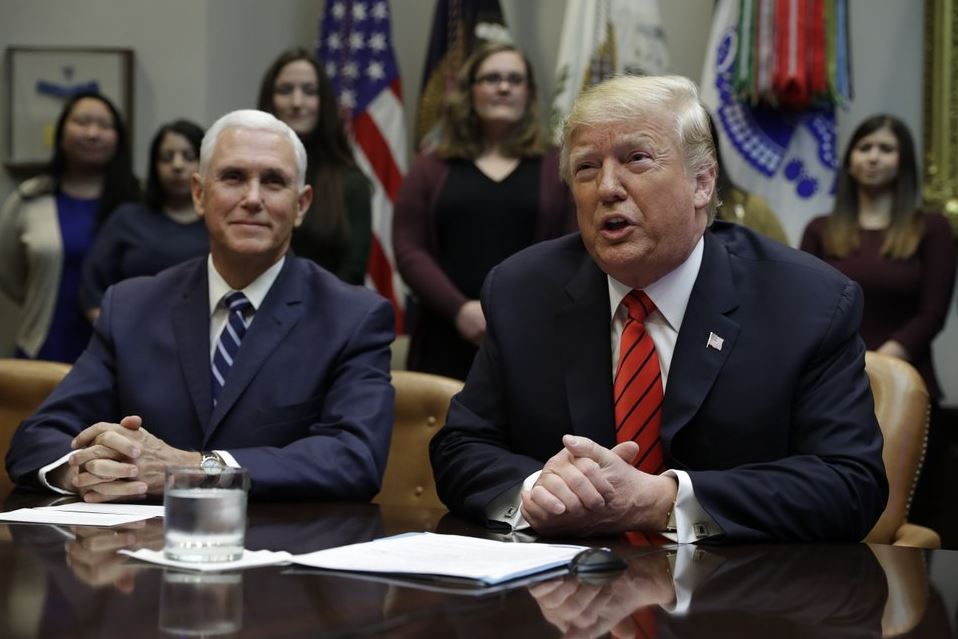
President Donald Trump arrives to speak to NASA astronauts carrying out the first ever all-female spacewalk, during a call from the Roosevelt Room of the White House, Friday, Oct. 18, 2019, in Washington, as Vice President Mike Pence looks on. (Photo: AP)
Claiming new progress against Islamic State extremists in Syria, President Donald Trump said Friday that some European nations are now willing to take responsibility for detained IS fighters who are from their countries.
“Anyway, big progress being made!!!!” he exclaimed on Twitter. A day earlier, he had proclaimed that a US-brokered cease-fire deal with Turkey marked “a great day for civilization,” though the deal’s effect was largely to mitigate a foreign policy crisis widely seen to be of his own making.
At the Pentagon, Defense Secretary Mark Esper said US troops are continuing their withdrawal from northern Syria. He also said no US ground troops will participate in enforcing or monitoring the cease-fire that Vice President Mike Pence announced Thursday in Ankara.
“The force protection of our service members remains our top priority and, as always, US forces will defend themselves from any threat as we complete our withdrawal from the area,” Esper told reporters.
In a series of tweets, Trump said he had spoken Friday to Turkish President Recep Tayyip Erdogan amid reports that fighting actually had not ended.
“He told me there was minor sniper and mortar fire that was quickly eliminated,” Trump tweeted, adding that there is “good will on both sides.” He said, “The US has secured the Oil & the ISIS Fighters are double secured by Kurds & Turkey.”
Later, in comments to reporters, Trump again spoke of taking oil. “We’ve taken control of the oil in the Middle East,” he said. White House officials had no immediate explanation for the comment, which seemed disconnected to any known developments in Syria or elsewhere in the Middle East.
Officials have said a number of ISIS fighters, likely just over 100, have escaped custody since Turkey launched its invasion last week.
Trump said nothing further about the European nations he contended had agreed to take some of the IS fighters.
After hours of negotiation in Ankara, the two nations Thursday agreed to a five-day cease-fire in the Turks’ deadly attacks on Kurdish fighters in northern Syria, but some fighting continued early Friday in a northeast Syrian border town. The Kurds were US allies in the fight against the Islamic State group but came under assault after Trump ordered US troops to leave the area earlier this month.
The agreement requires the Kurds to vacate a swath of territory in Syria along the Turkish border in an arrangement that largely solidifies Turkey’s position and aims in the weeklong conflict.
Pence, who reached the deal with Erdogan, hailed the agreement as the way to end the bloodshed caused by Turkey’s invasion.
But he remained silent on whether it amounted to a second abandonment of America’s former Kurdish allies, many of whom are branded as terrorists by Ankara. The deal includes a conditional halt to American economic sanctions and no apparent long-term consequences for Turkey for its actions.
Turkish troops and Turkish-backed Syrian fighters launched their offensive against Kurdish forces in northern Syria a week ago, two days after Trump suddenly announced he was withdrawing the US military from the area.
Trump was widely criticized for turning on the Kurds, who had taken heavy casualties as partners with the US in fighting IS extremists since 2016.
While US officials have insisted that Trump did not authorize Turkey’s invasion, the cease-fire codifies nearly all of Turkey’s stated goals in the conflict.
Turkish Foreign Minister Mevlut Cavusoglu said the United States had accepted the idea of a “safe zone” long pushed by Turkey, and he insisted Turkish armed forces will control the zone. He also made clear that Turkey will not stop at a previously limited zone; he said Turkish control of the Syrian side of the border must extend all the way to the Iraqi border.
Caught in the middle, the commander of Kurdish-led forces in Syria, Mazloum Abdi, told Kurdish TV, “We will do whatever we can for the success of the cease-fire agreement.” But one Kurdish official, Razan Hiddo, declared that Kurdish people would refuse to live under Turkish occupation.


